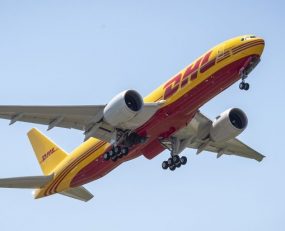
DHL Express MENA is expanding its regional aviation fleet with the addition of seven new Boeing 767-300F freighters. They are scheduled to be inducted gradually throughout 2021, starting in April. The planes, which will be based in DHL’s regional aviation headquarters in Bahrain, have been converted from passenger to freighter configuration by Boeing.
Nour Suliman, CEO of DHL Express MENA, stated the following, “This investment reiterates our focus on continuously deploying innovative solutions and technologies to meet customer demands. Based on our performance in 2020, where we saw historic peaks in cross-border e-commerce volumes both globally and in the region, we anticipate this trend to continue, and our enhanced air capacities will enable us to handle the increased demand for delivery expertise in time-definite express shipments.”
The addition of the new planes will increase DHL’s overall load capacity by over 33% and will be used to service existing high-demand lanes across the Middle East, Africa & Indian Subcontinent, which house some of DHL’s key commercial partners. The planes offer a 24% increased payload. They are fitted with Winglets, resulting in a 5% reduction in fuel burn and CO2 emissions, enabling DHL to fly more cost-efficiently.
“The average aircraft age of the B767-300F fleet acquired by DHL is 18 years, almost 20 years younger than our current B767-200F fleet, thereby offering operational continuity into the next decade. The proven versatility of these planes will ensure we further deliver the best quality service possible to our customers through greater speed, reliability and efficiency, while simultaneously contributing to our environmental objectives which aim to reduce all logistics-related emissions to zero by 2050,” explained Richard Gale, Head of DHL Aviation Middle East and Africa.
In the past six years, DHL has almost doubled its regional aviation touchpoints and boosted international flights in the region to over 175 per week for better cross-regional and global connectivity.
Source: Logistics Middle East